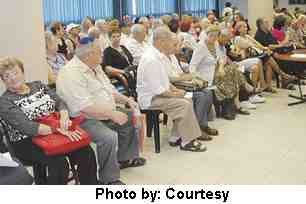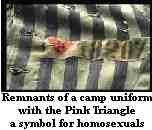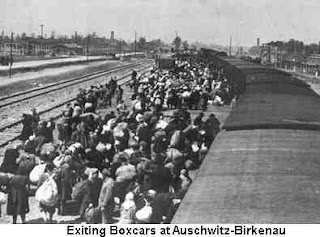

 This is one of many stories, some of which I’ve covered before. Israel’s leaders and Zionist apologists never fail to use the Holocaust as a weapon against anti-Zionists and Palestinians, but when it comes to the holocaust survivors themselves it’s different. They are denied the compensation the Israeli government was paid but which it used for Zionist goals – education and ‘redemption’ (i.e. theft of Palestinian land).
This is one of many stories, some of which I’ve covered before. Israel’s leaders and Zionist apologists never fail to use the Holocaust as a weapon against anti-Zionists and Palestinians, but when it comes to the holocaust survivors themselves it’s different. They are denied the compensation the Israeli government was paid but which it used for Zionist goals – education and ‘redemption’ (i.e. theft of Palestinian land).
This is the reality of Israel’s Racist Creed – a creed no different in principle from Nazi Germany. What matters is not the people individually but the collective ‘nation’ or ‘race’. Holocaust survivors are irrelevant as individuals but as a collective group are important for the use to which they can be put.
As is shown in the article below the Israeli State has constructed a complex bureaucracy that needs lawyers and experts to untangle in order to keep the compensation for holocaust survivors from the survivors.
Jerusalem Post Friday, April 29, 2011
By RUTH EGLASH
Many Holocaust survivors live in severe poverty, unaware of the benefits owed them, and must fight the system to realize their rights.
David Silberman, co-founder of the nonprofit organization Aviv Lenitzolei Hashoah (Spring for Holocaust Survivors), does not mince words when he proclaims that roughly NIS 250 million in funds meant to assist Holocaust survivors living in Israel remains unclaimed each year.
“It’s a very complicated process, and that’s exactly why we started Aviv,” states Silberman, who created the organization four years ago together with his wife Aviva, a legal expert in Holocaust survivors’ rights.
Speaking ahead of Holocaust Remembrance Day, which will be marked nationwide on Monday, he adds,
“She has been working in this field for more than 17 years and already knew all about the complexities of this topic. What she did not know, however, was exactly how many survivors are entitled to additional benefits but are not claiming them because the information is unclear and they are simply not aware.”
According to Silberman, “we thought this would only be a shortterm thing and that we would just pass on some information that would help all those involved in allocating resources to reach the actual survivors.”
In the four years since helping to start the NGO, he has become an expert on the ins and outs of the various compensation funds and additional benefit schemes meant to ease the daily living of more than 210,000 aging victims of Nazi persecution.
However, Silberman, who volunteers his time at the charity, points out that while there are some 15 government and non-governmental organizations all working to aid Holocaust survivors here, there is no single authority that can fit all the pieces together. With none of the groups able to see beyond its own paradigm, survivors are forced to go through an intense bureaucratic process even before they can understand what exactly they should be asking for.
Only this past Wednesday – after some 60-plus years of continued disconnect between all the organizations – did the Welfare and Social Services Ministry finally bring representatives of all these bodies, including Aviv, together for a round-table discussion on how to work together to help thousands of survivors live out their final years in comfort and dignity.
Silberman says it’s frustrating:
The survivors have been crying for years, saying they cannot make ends meet or cannot pay for their medicines, [and] social workers and others tell them that they cannot help, but it’s only because they have no idea about the pension schemes for them.
He adds that
“in most situations when you deal with poor people, it is difficult to help them, but when you are talking about Holocaust survivors, there is money out there but no one knows how to get at it.”
AS PART of its outreach work for this year’s Holocaust Remembrance Day, Aviv will release a series of 17 short video clips – available for download from its website and also to be screened throughout the day on Channel 2 – outlining what rights, benefits and compensation schemes are currently available for each specific group of survivors and how to apply for them, says Hagit Grubshtein, the organization’s deputy director.
“There is so much to understand that we felt the best way to explain would be to explain it visually,” says the 31-year-old trained lawyer who has been working with Aviv for three years.
“The problem is that there is no one body that can tell the survivor what his or her benefits should include; every organization does wonderful work but refuses to look at what the others are doing. At the moment, survivors come to us in order to understand the whole picture, and we try to help them.”
Among the videos to be released are ones outlining the eligibility guidelines and application procedures for the four Holocaust survivor compensation funds (two from Germany, administered by The Conference on Jewish Material Claims Against Germany, and two operated by the Israeli government’s Holocaust Survivors Rights Authority). There is also a rallying call to “thirdgeneration” Holocaust survivors, the grandchildren, to come forward and help the elderly survivors access their rights.
Silberman also highlights that one of the videos produced is in Russian, aimed at thousands of survivors who arrived in Israel during the 1990s from the former Soviet Union and Eastern Europe who do not fit the criteria outlined by the four official funds.
“Some of them are not aware that they are in fact entitled to a one-time payment and numerous social benefits that could help ease their lives,” noted Silberman.
According to numerous NGOs working in the field, many of these survivors arrived in the country with nothing and today live in severe poverty, relying on various charities for their day-to-day survival.
“Our goal is to break the stigma that only a lawyer is able to help survivors understand and obtain their rights,” says Grubshtein, who herself is the presenter of most of these low-budget but informative videos.
“There is not much time left to help these survivors, and we need to reach as many people as we can in order to address the injustice of the last 60 years.”
AMONG THE estimated 10,000 people that Aviv has helped since its formation is Ela Yael Kasner, 75, from Rehovot. Two months ago, the Romanian-born grandmother and great-grandmother received a significant payout from the German government, some 3,800 euros, for the three years she spent in a Nazi-run ghetto, thanks to Aviv volunteers who helped her apply for the money.
“We had nothing to eat and no warm clothes to wear when we lived in the ghetto,” recalls Kasner, who was only a child when she moved with her mother and two brothers to the Mogilev ghetto in Transnistria. “I did not see an egg or cheese or bread during those years, I lived on water and corn flour… I did not learn to read or write and only received an education when I arrived in Israel at age 12.”
She clearly remembers how her mother would force her to hide beneath the floorboards whenever she heard the boots of SS soldiers.
“I had to stay down there for hours with the rats,” says Kasner, whose father was taken away from the family during the war and united with the family at its end. He died from typhus only a few months after their arrival in Israel.
Despite the obvious hardships of rebuilding her life here following the war, Kasner says life was bearable until a few years ago, when her husband, also a Holocaust survivor, passed away.
“I faced a dilemma, and I went to apply for additional benefits as his widow but was told I was not eligible,” says Kasner, who then turned to Aviv for help.
The organization helped her to obtain some additional funds from the government and also to apply for a state pension from Germany, where last year a federal court ruled that payments should be made to all those who had worked in a ghetto during the war years.
“My situation is not so bad now, there are many others who are worse off than I am,” says Kasner, who in addition to the back payment will also receive 41 euros a month from Germany.
What is most upsetting, she says, is “knowing there is money but for some reason it does not reach us, they do not hand it out. You have to fight or put on a lot of pressure to get that money.”
“Even after three years, it still kills me to hear these stories,” observes Grubshtein. “I know we have had many successes in helping people, but they are still so few compared to all the bad things and the injustice that has taken place over the last 60 years.”
She adds, “I know that we can’t fix all the evil that has happened, but it is time that all the organizations dealing with this issue put their egos aside and try to work together to tackle the problem before it’s too late.”